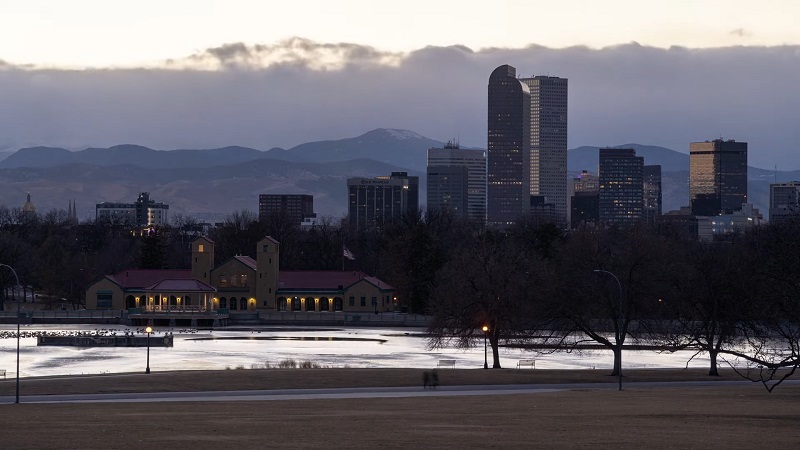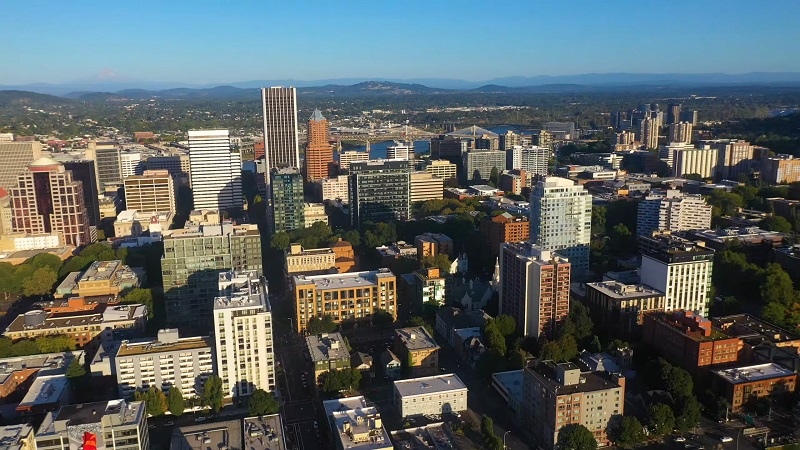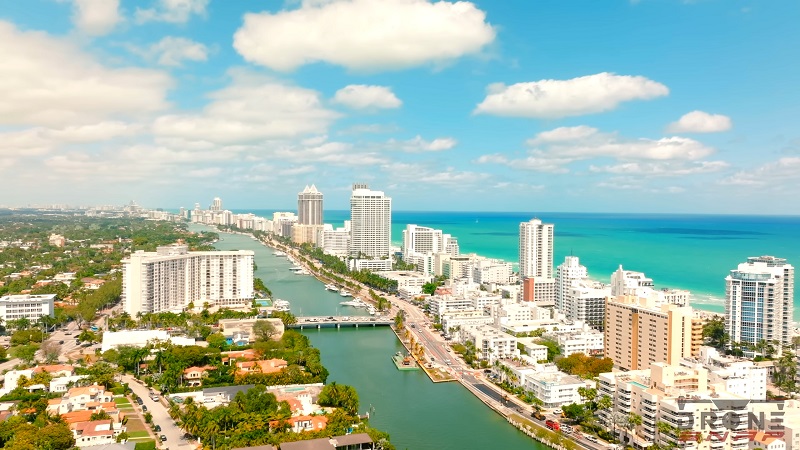Over 40% of U.S. full-time employees now work remotely at least part of the week—and a growing number are choosing to take their laptops on the road. But working from anywhere doesn’t mean working just anywhere.
If you’re looking for U.S. destinations that combine strong internet, coworking hubs, affordable living, and travel-worthy experiences, this guide breaks down the best cities and small towns to work remotely and explore at the same time—without sacrificing productivity.
Here are the top U.S. cities that offer the perfect mix of fast internet, coworking access, affordability, and lifestyle perks—ideal for digital nomads and remote professionals on the move.
| 📍 City | 🌆 Highlights | 💰 Cost of Living | 🌐 Internet & Coworking | 🌿 Lifestyle Perks |
| Austin, TX | Tech hub, vibrant community, food & music | Mid-range | 184 Mbps download, top spaces like Industrious & Capital Factory | Year-round warm weather |
| Denver, CO | Urban + outdoors, remote community | Affordable with roommates | Reliable internet, coworking like WeWork, Green Spaces | Mountain hikes, great food |
| Portland, OR | Artistic, coffee culture | Moderate | WeWork, NedSpace, Industrious | Creative, outdoorsy |
| Seattle, WA | Tech-centered, scenic | High (avg. $1900/month) | Cloud Room, Premier Workspaces | National parks, coffee culture |
| Miami, FL | Beaches, vibrant city | Mid-high | 206 Mbps fixed, many coworking spots | Warm, diverse activities |
Let’s find your next “office with a view.”
Top U.S. Cities for Working Remotely and Traveling
These cities strike the perfect balance between connectivity and livability, offering everything a remote worker needs—with built-in opportunities to explore, network, and thrive.
1. Austin, Texas

Once a quirky college town, Austin has become a serious tech magnet—home to startups, digital creatives, and major players like Tesla and Oracle. But despite its rapid growth, it hasn’t lost its laid-back, live-music soul.
- Why It Works: Fast-growing tech hub with strong community vibes.
- Internet: Avg. 184 Mbps download, 89 Mbps upload.
- Top Coworking Spots: Industrious Austin, Capital Factory, Epoch Coffee.
- Perks: Year-round warmth, food truck culture, and a city made for creatives.
2. Denver, Colorado

Denver sits at the intersection of business and adventure. With a booming economy and the Rocky Mountains just outside city limits, it’s ideal for remote workers who want productivity during the week and mountain escapes on weekends.
- Why It Works: High quality of life and a collaborative freelancer scene.
- Internet: Consistently fast in cafés, coworking spaces, and Airbnb rentals.
- Top Coworking Spots: WeWork, Green Spaces, Expansive 16th Street.
- Perks: Easy access to hiking, affordable long-term stays, and top-rated food delivery.
3. Portland, Oregon

Portland offers a slower pace without sacrificing amenities. Known for its indie spirit, thriving coffee culture, and green thinking, it’s a favorite for creatives and solo remote workers looking for balance and inspiration.
- Why It Works: Mid-tier affordability and a welcoming creative community.
- Internet: Stable connectivity, wide access to public Wi-Fi and eSIMs.
- Top Coworking Spots: NedSpace, Industrious, WeWork.
- Perks: Great biking infrastructure, artisan cafés, and proximity to nature.
4. Seattle, Washington
If you’re in tech or want to network with some of the best minds in the industry, Seattle is a powerhouse. Home to Amazon and Microsoft, the city also delivers Pacific Northwest charm with a side of caffeine.

- Why It Works: Major corporate presence meets startup flexibility.
- Internet: High-speed and dependable; eSIMs available for short-term stays.
- Top Coworking Spots: Cloud Room, Premier Workspaces.
- Perks: Access to Mount Rainier, strong coffee culture, and urban-nature balance.
5. Miami, Florida

Miami isn’t just for vacation anymore. With remote workers flocking in from colder cities, Miami has transformed into a bilingual business and lifestyle destination. Sun, sand, and startup energy collide here.
- Why It Works: Global energy with a growing digital nomad scene.
- Internet: Mobile 128 Mbps, broadband 206 Mbps—among the fastest in the U.S.
- Top Coworking Spots: The LAB Miami, Pipeline Workspaces, and growing options in Brickell.
- Perks: Beachfront breaks, cultural diversity, and easy access to Latin America.
Best Small Towns for Digital Nomads
Not every remote worker wants the hustle of a big city. These lesser-known gems offer scenic beauty, affordability, and solid connectivity—making them surprisingly ideal for a slower-paced digital nomad lifestyle.
1. Paducah, Kentucky

Located on the banks of the Ohio River, Paducah is a UNESCO Creative City known for its vibrant arts district, quirky downtown, and tight-knit community. It’s proof that small-town America can still offer global appeal.
- Why It Works: Affordable housing and strong cultural identity.
- Internet: Reliable and fast across the downtown core.
- Cost of Living: Average home price around $280,000.
- Bonus Perks: Family-friendly, walkable, and home to two major hospitals.
- Remote Worker Incentives: Offers cash relocation bonuses (~$5,000) for remote workers.
2. Jackson, Michigan

Strategically located between Detroit and Chicago, Jackson blends small-town comfort with regional accessibility. It’s ideal for those who want green space, peace, and productivity in one package.
- Why It Works: Budget-friendly housing with solid infrastructure.
- Internet: Stable, with many accommodations and public spots offering high-speed service.
- Cost of Living: Average home price around $170,000.
- Lifestyle: Local festivals, rich history, and plenty of parks and trails.
- Healthcare: Accessible services and regional hospitals available.
- Remote Worker Incentives: Similar cash relocation benefits to Paducah.
These small towns offer a slower, more intentional lifestyle for remote workers—and can be ideal bases for long-term remote setups or seasonal retreats.
Key Factors to Consider When Choosing a Remote Work Destination
Choosing the right place to work remotely isn’t just about the scenery—it’s about sustainability. The following factors can make or break your remote work setup, no matter how exciting the location looks on paper.
1. Internet Speed and Stability
For remote workers, fast and reliable internet is non-negotiable. Look for cities with strong broadband infrastructure or widespread access to 5G and public Wi-Fi. Bonus: availability of eSIMs or portable hotspots can help maintain connectivity on the go.
2. Cost of Living

A low cost of living can dramatically increase your quality of life. Consider:
- Average rent for 1-bedroom apartments
- Grocery and transportation costs
- Workspace access (some coworking memberships offer city-wide passes)
3. Co-Working Spaces and Work-Friendly Cafés
Even if you plan to work from home, coworking spaces offer community, structure, and networking opportunities. In top cities like Austin or Seattle, options like WeWork, Industrious, and Impact Hub give you access to high-quality environments and professional support.
4. Lifestyle and Environment
Remote work isn’t just about staying online—it’s also about maintaining your mental health and enjoying where you live. Prioritize locations with:
- Access to nature (hiking, beaches, parks)
- Cultural or community events
- Safety and walkability
5. Legal & Tax Considerations

If you’re moving across state lines—or coming from abroad—understand:
- State tax rules: Some states (e.g., Texas, Florida) have no state income tax
- Work authorization: Foreign nationals must have the proper visa (e.g., not all tourist visas allow remote work legally)
- Permanent vs. temporary relocation: Know if your employer has restrictions
Strategic Tools and Support for Digital Nomads
Remote work isn’t just about location—it’s also about having the right tools to stay productive, professional, and protected wherever you are.
VPN + Security Tools
When working from different networks—cafés, Airbnbs, or coworking hubs—privacy is essential. Use a trusted VPN to secure your connection and mask your physical location if needed (especially if company policy limits where you can log in from).

Communication & Localization Support
Working across global markets or multilingual teams? It’s essential to keep communication clear and culturally adapted. That’s where tools to find translation services come in—whether you’re updating web content, handling global clients, or collaborating across borders, translation can bridge both language and credibility gaps.
Travel-Ready Gear
Optimize your mobile office with:
- EVERKI wheeled laptop backpack (compact, organized, TSA-friendly)
- Foldable laptop stand
- Portable travel router
- Noise-canceling headphones
- Power bank with USB-C output
Co-Working Networks & Platforms
Use platforms like:
- WeWork All Access (global pass to coworking spaces)
- Impact Hub (mission-driven entrepreneurs and social innovators)
- Trusted Housesitters (score long stays in exchange for pet/house care)
Common Challenges + Pro Tips for Working While Traveling
Working remotely while traveling sounds like the dream—but success hinges on planning, discipline, and the right systems. Here’s how to handle the biggest challenges you’ll likely face, and how to stay productive and stress-free.
Challenge 1: Distractions & FOMO

The Problem: When you’re working from a city you’ve always wanted to explore—or a beachfront Airbnb—it’s tempting to ditch the laptop and dive into sightseeing or social events. The downside? Missed deadlines and late-night work marathons. That underlying urge is often driven by FOMO (Fear of Missing Out)—the anxiety that you’re wasting a once-in-a-lifetime experience by staying in to work.
Challenge 2: Burnout From Constant Movement
The Problem: Many digital nomads overplan their travel—switching cities every few days or weeks. Constant packing, transit, and adjusting to new routines eats into productivity and drains your energy.
Challenge 3: Employer Location Policies & Surveillance
The Problem: Some employers restrict remote work to specific countries or time zones due to legal, tax, or security concerns. Even if your work is fully remote, logging in from abroad could raise HR red flags.
Challenge 4: Unreliable or Insecure Wi-Fi
The Problem: Even if a listing says it has “high-speed internet,” the reality can be wildly different. Remote mountain cabins, island towns, or even budget hotels may suffer from unstable or slow Wi-Fi.
- Test Wi-Fi speed using apps like Speedtest.net as soon as you arrive.
- Travel with a local eSIM or portable hotspot as backup. Services like Airalo or Holafly offer affordable data in most countries.
- Use a travel router (like TP-Link Nano) to boost weak signals inside rentals.
Challenge 5: Legal, Visa & Tax Complications
The Problem: Many digital nomads work under tourist visas, which may violate immigration laws—even if you’re not taking local clients. You also risk double taxation if you’re earning in one jurisdiction but physically located in another.

- For U.S. residents traveling domestically: check state tax rules—some states may require you to file taxes if you spend enough time there.
- For international travel: research Digital Nomad Visas. Countries like Portugal, Estonia, and Costa Rica now offer legal long-term stays for remote workers without triggering local taxes.
- Always maintain proof of income and travel health insurance in case of border questioning.
Final Thoughts: Choose Your Office, Choose Your Life
Remote work isn’t just a trend—it’s a permanent shift in how, where, and why we work. But working remotely while traveling adds a layer of complexity that demands the right environment, discipline, and setup.
Whether you’re drawn to the tech energy of Austin, the outdoor lifestyle of Denver, or the quiet charm of Paducah, the key is finding a place that aligns with your priorities—from cost of living and Wi-Fi reliability to community vibes and natural beauty.
Start small. Test cities. Stay longer in the ones that work for your lifestyle. And remember: the best place to work remotely is the one where you’re not just more productive—but more alive.

